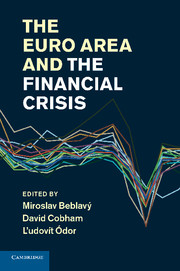Book contents
- Frontmatter
- Contents
- Figures
- Tables
- Boxes
- Contributors
- Abbreviations and acronyms
- 1 Introduction
- 2 Towards a new architecture for financial stability in Europe
- Part I The experience of the crisis
- Part II Accession to the euro area
- Part III The future of the euro area
- 11 Why the current account may matter in a monetary union: lessons from the financial crisis in the euro area
- 12 National fiscal rules within the EU framework
- 13 The road to better resolution: from bail-out to bail-in
- 14 Financial stability and monetary policy: lessons from the euro area
- 15 Is there a case for price-level targeting?
- 16 Heterogeneity in the euro area and why it matters for the future of the currency union
- 17 The euro area: how to regain confidence?
- 18 How to regain confidence in the euro area?
- 19 How to save the euro? Lessons from the US
- Index
- References
19 - How to save the euro? Lessons from the US
from Part III - The future of the euro area
Published online by Cambridge University Press: 07 October 2011
- Frontmatter
- Contents
- Figures
- Tables
- Boxes
- Contributors
- Abbreviations and acronyms
- 1 Introduction
- 2 Towards a new architecture for financial stability in Europe
- Part I The experience of the crisis
- Part II Accession to the euro area
- Part III The future of the euro area
- 11 Why the current account may matter in a monetary union: lessons from the financial crisis in the euro area
- 12 National fiscal rules within the EU framework
- 13 The road to better resolution: from bail-out to bail-in
- 14 Financial stability and monetary policy: lessons from the euro area
- 15 Is there a case for price-level targeting?
- 16 Heterogeneity in the euro area and why it matters for the future of the currency union
- 17 The euro area: how to regain confidence?
- 18 How to regain confidence in the euro area?
- 19 How to save the euro? Lessons from the US
- Index
- References
Summary
The problems of the euro area brought to light some failures of the system. Nevertheless, the resulting drop in confidence in the system has gone further than one could expect. Questions have even arisen about the system's survival. Yet monetary systems do not tend to dissolve simply because of faulty performance. On the contrary, as a rule they endure even when they function very badly. It takes a political force majeure to bring about the break-up of a single currency area, typically without connection to its monetary performance. Why, then, has the possible default of a country engaged in irresponsible fiscal policy and accounting for only 3 per cent of the euro area's GDP raised questions about ‘saving the euro’ and the survival of the Eurozone? The issue has not received the attention it deserves. It is often simply taken for granted that the departures from the Stability and Growth Pact (SGP) provide a sufficient reason for the earthquake that has shaken the whole currency area. Yet if we look around the world past and present, the mismanagement of finances by regional governments has no particular tendency to bring down entire monetary systems, far from it. In line with the usual – I think superficial – diagnosis of the ailment, proposed remedies for the euro area centre on strengthening the SPG, increasing joint political control over fiscal policy and providing joint insurance against government default, or some mixture of the three. But what if a vital element of the problem is really the official doctrine that sovereign default is incompatible with the euro? What if the scale of the crisis that took place has resulted from financial markets’ conviction, based on that doctrine, that the future of the euro was at stake? What if assuring the long-run sustainability of the euro means convincing those markets, quite differently, that nothing as manageable as a Greek default can upset the euro area? That is precisely what the US example would suggest and what I will defend. In that case, the right road ahead looks quite different. It means shifting the emphasis away from avoiding government defaults toward assuring the stability and the solvency of the banking system at all times, regardless of the financial difficulties of some member governments.
- Type
- Chapter
- Information
- The Euro Area and the Financial Crisis , pp. 340 - 343Publisher: Cambridge University PressPrint publication year: 2011



